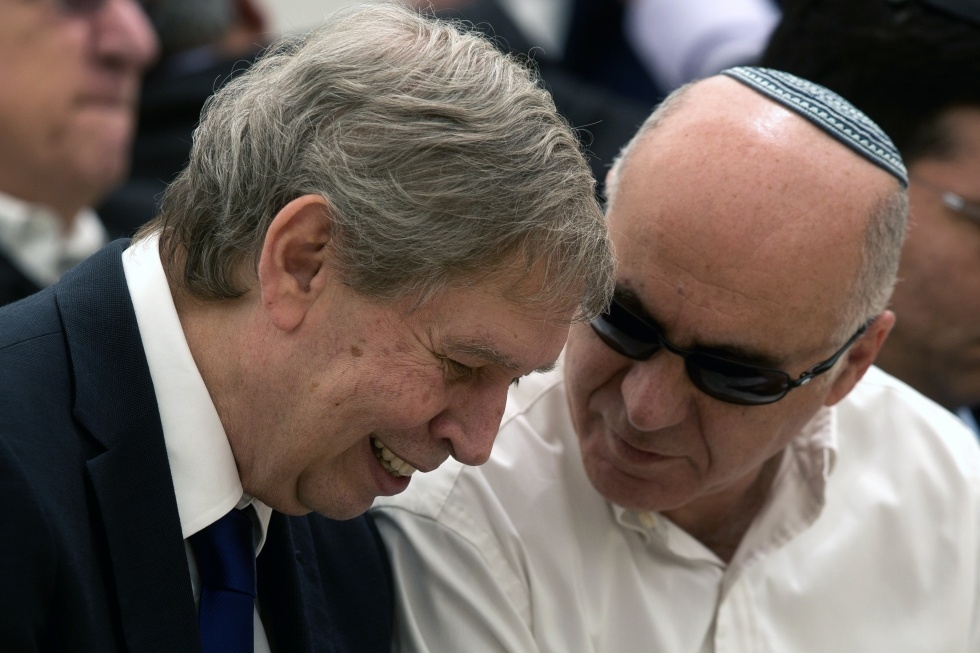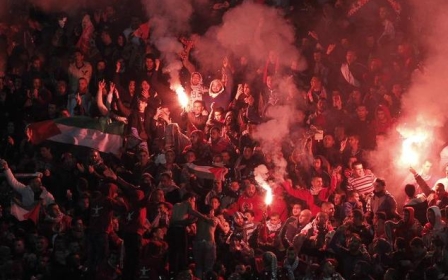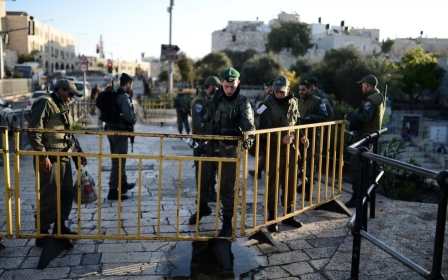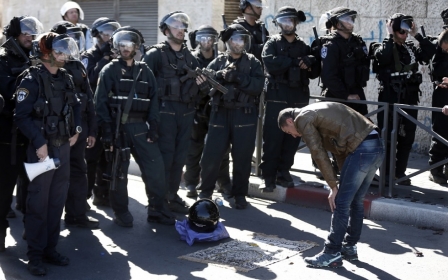Israel's opposition from within

In 2011, when Prime Minister Benjamin Netanyahu nominated a new head for the Israeli internal intelligence organ, the General Security Service (GSS, known in Hebrew as Shin Bet) the smart money was on the organisation’s Jewish department head getting the top job.
Instead, Netanyahu chose Yoram Cohen - the first Orthodox Jew - to head the Shin Bet, who was reportedly named due to intense pressure from the settler's lobby, which probably thought that Cohen was their man for the job.
Yet, whatever Cohen's political views might be, last week he dealt an unpleasant blow on Netanyahu's efforts to convince the Israeli public and the international community that Palestinian President, Mahmud Abbas (Abu Mazen) is directly responsible for the last terror attacks in Jerusalem.
Appearing before the prestigious Foreign and Security committee in the Knesset, Cohen said that "Abu Mazen is not interested in terror and does not lead to terror… neither does he do it under the table." Right-wing parliamentarians were furious and called for Cohen's resignation.
Israeli Chief of Police, Yohanan Danino, is also not affiliated with the left. He too was nominated by Netanyahu and approved by Avigdor Lieberman, whose party, Israel Our Home, holds the Internal Security Ministry. Yet, much like his counterpart from the Shin Bet, yesterday Danino openly contradicted the messages coming from Netanyahu's government.
All declarations expressing the will to change the status quo on Temple Mount (Haram a-Sharif) had a negative effect on the Muslim world, commented Danino during a public discussion. His announcement practically took the carpet beneath official Israeli claims that attribute growing tensions over al-Aqsa to Palestinian incitement - not any Israeli deeds or misdeeds. Calls to relieve Danino from his job were quick to come.
Danino and Cohen are still in office, so their freedom to express themselves is limited but a rift between security services and the political elites appears to be brewing.
Yuval Diskin, Cohen's predecessor at the head of Shin Bet, long ago took off the gloves. Already a year ago, he warned that a "huge explosion" was coming because of Israel’s ongoing policy of colonisation in the West Bank, causing the Palestinians to lose hope and to sink into despair. In the last weeks, Diskin has turned into an apocalyptic prophet, claiming that Israel's policy of using more force to quell the Palestinian uprising has gone bankrupt.
Even Shabtai Shavit, ex-head of the Mossad and usually a staunch hawk, wrote an alarming article in Haaretz just last week. "For the first time as a grown up, I am truly worried for the fate of the Zionist project," wrote Shavit. "On the one hand, I am worried because of the critical mass of the threats against us, on the other because of the blindness and the political and strategic paralysis of the government."
None of these current or previous seniors in the Israeli security apparatus have any special sympathy for Palestinians or the Palestinian cause. While criticising the government for not going into serious dialogue with the Palestinians, during Operation Defensive Shield in 2002, Diskin encouraged Israel to reoccupy the whole Gaza Strip. So, why are Israel’s security leaders so alarmed? And what is driving them to go against Netayahu's government and its policies?
In Cohen's case, the answer is quite simple: he is just describing everyday reality. The Palestinian Authority is keeping intact its security cooperation with Israel, despite its ever growing unpopularity with the Palestinian public, especially after the last devastating war on Gaza.
As head of Shin Bet, Cohen is aware of it more than anyone else in Israel. Denying it would not only be dishonest- it might damage the intimate relations his organisation is having with Palestinian security forces. Cohen knows that President Abbas does not want a new intifada for his own reasons, and while he is not doing it in order to please Israel, the result is the same.
But there is more to it than just telling the truth. An Israeli parliamentarian present at Cohen's testimony had the impression that Cohen is truly worried. His job is to keep violence as low as possible, but he sees his government doing everything it can so as to inflame the situation. In this volatile climate, Cohen and Danino, as civil servants, have been left feeling that they cannot do their job properly.
From his words, it was evident that Cohen sees the efforts to change the status quo on Temple Mount as dangerous and that he warned Netanyahu against pushing through such a move. Chief of Police, Danino was not shy to say it in public. The decision to allow right-wing politicians to go there, he said yesterday, was a mistake.
So, if such high-level officers in the security apparatus were warning, openly and in closed doors, from further escalation, why did Netanyahu allow it to happen in the first place?
The common wisdom within political circles is that after the disappointing results of the war on Gaza, Netanyahu was too weak to stand in the way of the Temple Mount movement and their right-wing followers. According to this theory, Netanyahu was dragged into the situation, and once things began to deteriorate, he had no choice but to put the blame on president Abbas.
Yet there is another more conspiratorial explanation. After the non-victory in Operation Defensive Shield this summer, or so goes the theory, Netanyahu saw that Israel was cornered, and that international pressure was mounting while the negotiations with the Palestinians were all but dead. So he opted for intentional provocation, allowing the Temple Mount movements to do their job, hoping to "rock the boat." This plan worked out better – or worse - than Netanyahu expected.
There are no real evidence to support this theory, but the fact is that after Netanyahu was summoned to Amman two weeks ago to meet with King Abdullah of Jordan and US Secretary of State, John Kerry, the visits of right-wing politicians to Temple Mount came to a halt. This proves that Netanyahu could have put an end to this earlier, had he wanted to.
This way or the other, it is clear that Netanyahu and his ever-more extreme right-wing coalition is having to deal with growing opposition from the security apparatus. Not for ideological reasons, not because these senior officials came suddenly to a conclusion that occupation is wrong and must be stopped, but because they feel that their government is at a loss, and that it does not know which direction it is headed.
Maybe it is not by chance that the opposition is coming from organs responsible for internal security like the Shin Bet and the police. Instead of focusing in the occupied West Bank or the Gaza Strip, the Israeli-Palestinian conflict is becoming an internal conflict, a conflict between Jews and Palestinians who live under full Israeli control – Palestinians in East Jerusalem or in sovereign Israel. Israelis were promised that the separation wall would keep the conflict far away, in the West Bank and Gaza. Now the conflict is increasingly felt inside the walls, in East Jerusalem and to a certain extent in Um Al-Fahem or Kfar Kana in northern Israel, as well as elsewhere.
The" internalisation" of the conflict may explain the watershed of anti-Arab legislation, from the notorious Nation Law to law proposals intent on depriving Palestinians of their residency status or even their citizenship if they "support terror." Cohen and Danino and others may understand that if this conflict becomes a conflict between communities, it will be very difficult if not impossible to control it. And this is exactly what their job requires them to do.
Meron Rapoport is an Israeli journalist and writer, winner of the Napoli International Prize for Journalism for a inquiry about the stealing of olive trees from their Palestinian owners. He is ex-head of the News Department in Haaertz, and now an independent journalist.
New MEE newsletter: Jerusalem Dispatch
Sign up to get the latest insights and analysis on Israel-Palestine, alongside Turkey Unpacked and other MEE newsletters
Middle East Eye delivers independent and unrivalled coverage and analysis of the Middle East, North Africa and beyond. To learn more about republishing this content and the associated fees, please fill out this form. More about MEE can be found here.





